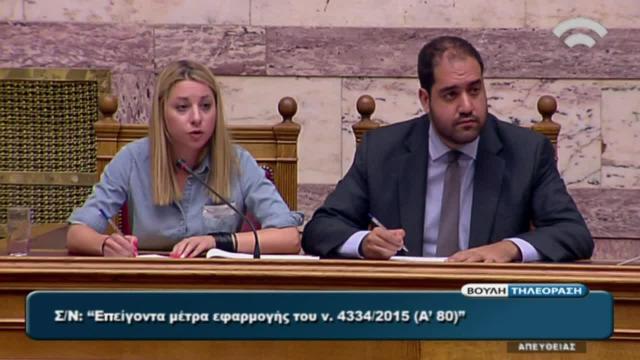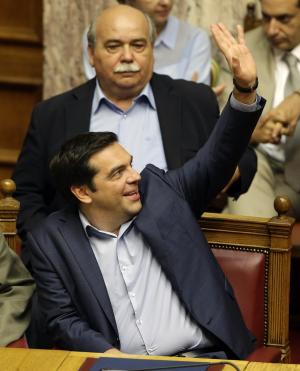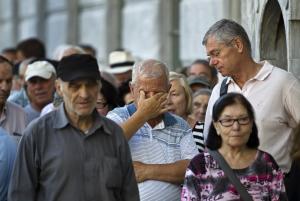Bailout talks back in Athens, as tough conditions approved
Bailout talks back in Athens, as tough conditions approved
ATHENS, Greece (AP) — Discussions over Greece's third bailout in five years are set to begin in Athens imminently after Greece's parliament approved Thursday tough new conditions set by European creditors.
Officials in Athens and at the European Union said negotiators are expected to start arriving on Friday, marking the first time high-level talks will be held in the Greek capital since Prime Minister Alexis Tsipras' left-wing government assumed power in late January.
The news came hours after the Greek parliament approved a second round of reforms demanded by Greece's creditors before the negotiations could start over a three-year financial bailout expected to be worth 85 billion euros ($93 billion).
Without the money, Greece would be unable to pay the debts due over the coming three years and would likely be forced to leave the euro, Europe's shared currency. Last week's decision at a summit of the eurozone's 19 leaders to open up bailout discussions provided certain conditions were met by Athens has helped ease the sense of economic crisis that was enveloping Greece.
Over the past week, parliament has approved two sets of creditor demands — the first introduced sweeping sales tax increases, the second concerned judicial and banking reforms.
Despite facing a rebellion among his own party's ranks in both votes, Tsipras' coalition government has survived. He relied on opposition parties to push the measures through.
"We have chosen a compromise that forces us to implement a program in which we do not believe, and we will implement it because the alternatives are tough," Tsipras said. "We are summoned today to legislate under a state of emergency."
Both sides hope discussions will conclude by Aug. 20, when Greece has a payment of a little more than 3 billion euros ($3.2 billion) due to the European Central Bank.
A government official in Athens, who asked not to be identified because negotiations had not formally started, said Greece was determined to resist any further conditions being set for the third bailout.
Greece has committed to reducing state spending on pensions, but says it need more time to draw up measures that spare low-income retirees further hardship. Major pension changes were not included in either round of reforms approved by parliament.
The start of the formal discussions in Athens shows how times have changed since Tsipras' radical left Syriza party was elected on a promise to bring an end to the austerity that it blamed for many of the country's economic ills.
While in opposition, Syriza was hugely critical of the so-called troika — bailout inspectors from the European Commission, ECB, and International Monetary Fund who regularly came to the capital to discuss the Greek economy.
After assuming office, Tsipras declared that the "troika" was finished, and refused to let representatives from the European Commission, European Central Bank and International Monetary Fund negotiators into Greek ministry buildings, insisting instead on discreet meetings in Athens hotels, and talks in Brussels.
Now, the ministry inspections look set to start again.
The IMF will not be directly involved in the discussions in Athens. The fund has been critical of many of the demands insisted upon by Greece's European creditors and is insisting on deep and meaningful debt relief for the country.
Despite years of austerity that's seen the annual budget deficit fall dramatically, Greece's debt burden has increased because the economy has shrunk by a quarter. Figures this week showed Greece's debt at the end of the first quarter improved slightly to just below 170 percent. Still, it's the highest rate in the whole of the eurozone.
"We feel that debt relief is required," IMF spokesman Gerry Rice said in Washington. Rice added that it was not clear when negotiators from the IMF would rejoin the talks.
Following the two parliamentary votes that's allowed the ECB to raise its emergency liquidity assistance to Greek banks, the Greek government will be hoping the economy stabilizes somewhat following a crisis-ridden period that's seen strict capital controls imposed amid fears over the country's future in the euro.
Banks reopened Monday after being shuttered for more than three weeks, albeit for limited transactions. Daily withdrawals at ATMs are still limited to 60 euros ($65) per account holder.
Dissent within Tsipras' Syriza party twice came close to toppling the government, and has fuelled speculation of an earlier-than-expected general election in fall. But party critics insisted they continued to back Tsipras while disagreeing over the terms of the third bailout.
"Diversity is the strength of our party, not its weakness," former minister and outspoken dissenter Panagiotis Lafazanis said.
___
Associated Press Writers Paul Wiseman in Washington D.C., Raf Casert in Brussels and Menelaos Hadjicostis in Athens contributed to this report. YAHOONEWS







Comments